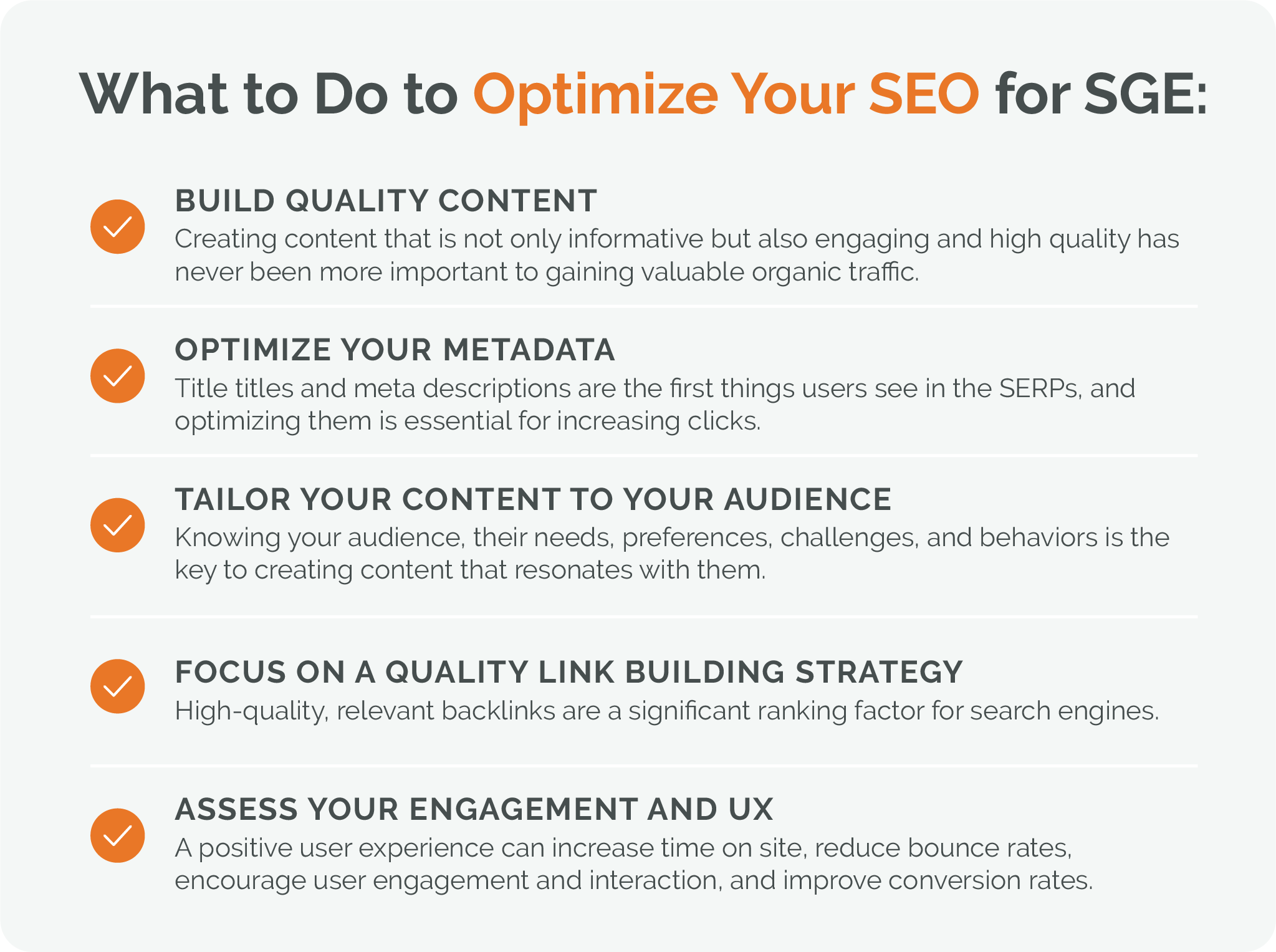In recent months, Google has significantly altered its algorithm and search engine results pages (SERPs), with the introduction of SGE (Search Generative Experience) being a notable change. SGE provides users with an AI-powered overview of the results they are searching for, reshaping how information is presented and accessed for anyone who browses or searches the web.
Wondering how this may impact your business and digital marketing experience? Here, we will go into the details of SGE and its implications on search engine optimization (SEO), providing insights to optimize your SEO strategy with these updates and best practices in mind.
What Is SGE?
SGE, or Search Generative Experience, is a groundbreaking feature by Google Search Labs that utilizes Artificial Intelligence (AI) and Machine Learning (ML) to revolutionize the user search experience. It gathers all different types of information to present users with concise, coherent, and enriched overviews of their search queries, allowing for more relevant and efficient answers. The AI-powered approach of SGE is designed to understand and process the underlying content, going beyond keyword matching to dive deeper into the semantics and actual context of the content. Ultimately, it provides meaningful and insightful overviews that address user queries more holistically.
The introduction of SGE has significantly impacted the presentation and ranking of Google search results, placing even more importance on high-quality, informative, and user-centric content. When websites meet these criteria, they are rewarded with better visibility and higher rankings in the SERPs. As you keep using it, SGE continually adapts to user behavior and preferences, adjusting and changing its algorithms to better understand user intent and deliver more personalized and relevant search results. This adaptability and emphasis on quality and relevance are completely changing SEO strategies, requiring more focus on creating content that aligns with user intent and offers genuine value.
How Has SGE Impacted Website Traffic and SEO?
The arrival of Google SGE has brought substantial shifts in website traffic and SEO landscapes. Websites now need to shift what’s important and instead prioritize quality, relevance, and user engagement more than ever to rank favorably in SGE-enhanced SERPs. The AI-driven approach of SGE places heavy emphasis on content that is coherent, informative, and tailored to the audience’s needs, impacting how websites approach their SEO strategies.
What to Do to Optimize Your SEO for SGE:
1. Build Quality Content:
Creating content that is not only informative but also engaging and high quality has never been more important to gaining valuable organic traffic. Your business’s content should address user queries effectively, providing clear, concise, and accurate information and answers to questions. It should also add value to the user, offering insights, solutions, or knowledge that is relevant and beneficial. Why does this matter? Well, SGE favors well-researched, well-written, and well-presented content, as it aims to provide users with the best possible answers to their queries. Incorporating multimedia elements like images, videos, and infographics can also add to the quality and appeal of the content, making it even more enticing and engaging.
2. Optimize Your Metadata:
Title titles and meta descriptions are the first things users see in the SERPs, and optimizing them is essential for increasing clicks. When creating your title tag and meta descriptions, you want to make them compelling, clear, and concise while also providing a brief overview of the value proposition of your offering. It’s helpful to include relevant keywords in the metadata to improve visibility in the SERPs, but it’s important to avoid keyword stuffing and ensure the metadata accurately represents the content. Properly optimized metadata can significantly enhance the click-through rate (CTR), driving more organic traffic to the website.
3. Tailor Your Content to Your Audience:
Knowing your audience, their needs, preferences, challenges, and behaviors is the key to creating content that resonates with them. Content that is aligned with the audience’s interests and needs is more likely to engage them and encourage interaction. For example, what is the most frequently asked question you get from customers? Creating a piece of content that answers that question and provides additional information to help them along in their journey can guide them to convert (and maybe even stick around). You can also utilize analytics to gain insights into audience demographics, behaviors, and preferences, which can help to create more targeted and relevant content, improving user satisfaction and engagement.
4. Focus On a Quality Link Building Strategy:
High-quality, relevant backlinks are a significant ranking factor for search engines. They are endorsements or the “gold star” of your content’s credibility and authority. To build a robust link-building strategy, you’ll first want to create link-worthy content and reach out to reputable websites for backlinks. When doing so, make sure you focus on the quality of the links rather than the quantity, as links from high-authority, relevant sites have a greater impact on search engine rankings. It’s also important to regularly audit your link profile to remove or disavow low-quality or spammy links – this is essential to maintain a healthy backlink profile.
5. Assess Your Engagement and UX:
User engagement and user experience (UX) are critical factors in SEO. A positive user experience can increase time on site, reduce bounce rates, encourage user engagement and interaction, and improve conversion rates. There are a few key areas to optimize when it comes to UX: usability, navigation, and design are the elements that provide a seamless and enjoyable user experience. Also, regularly analyzing user engagement metrics like session engagement rate, time on page, and conversion rate can help identify improvement areas and optimize the user journey. It’s also recommended to consider user feedback and conduct usability testing to gain valuable insights to enhance user engagement and satisfaction.
For more tips to optimize your SEO strategy for SGE, explore our comprehensive SEO solutions and see how our AI-powered strategies spearhead digital marketing advancements.
Are You Ready for the Generative Experience?
Adapting to the evolving digital landscape is crucial for staying ahead in the competitive market. If you want to refine your SEO strategy to align with SGE and other advancements, contact Zero Gravity Marketing for tailored digital marketing solutions and expert advice.
FAQ:
Is SGE harmful to SEO?
SGE is not inherently harmful to SEO; however, it does mean you should reevaluate and refine your SEO strategies to align with the new dynamics it introduces.
How should I optimize my website for SGE?
Optimizing for SGE involves focusing on quality content creation, metadata optimization, audience-centric content, quality link building, and enhancing user engagement and experience.
What is SGE useful for?
Google’s SGE is instrumental in providing users with enriched, concise, and relevant overviews of search results, improving the overall search experience. For more insights and detailed strategies on SGE and its impact on SEO, visit our SGE guide and explore our digital marketing solutions.
Elevate Your SEO Strategy, and Let ZGM Help!
The introduction of SGE has changed the SEO landscape, emphasizing quality, relevance, and user experience. By understanding the intricacies of SGE and implementing the right strategies, businesses can optimize their online presence and stay ahead of the evolving digital environment and competitors. Zero Gravity Marketing is at the forefront of navigating these changes, offering innovative digital marketing solutions and expert guidance to help you leverage the opportunities presented by SGE and other advancements in the industry.
Ready to get started? For more information and to explore our services, visit Zero Gravity Marketing.








